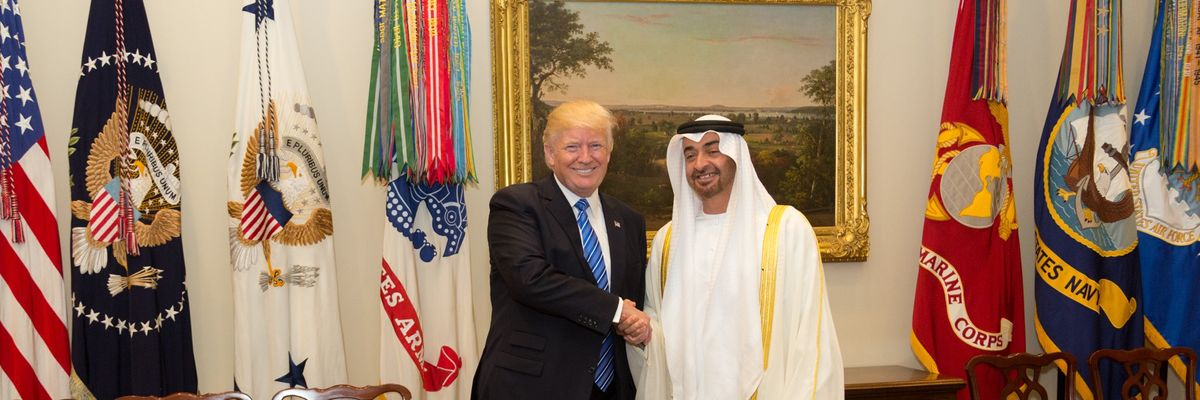President Trump’s announcement that an agreement has been reached for the “full normalization of relations” between Israel and the United Arab Emirates (UAE) is, at first glance, an impressive achievement for a president whose much-vaunted ‘Vision for Peace’ has struggled to gain traction. For Israel’s embattled Prime Minister, Benjamin Netanyahu, the breakthrough is symbolically important as he faces the prospect of a potential fourth election in nineteen months this November.
The UAE likely will portray the agreement as consistent with its self-proclaimed emphasis on “moderation” and “tolerance,” especially in regard to interfaith dialogue and cooperation, which have formed key components of the UAE’s recent messaging and international outreach.
The statement released by President Trump declared that Israel would suspend its plans to annex areas of the West Bank in exchange for the establishment of diplomatic relations with the UAE, which would become only the third Arab state — after Egypt in 1979 and Jordan in 1994 — and the first Gulf State to formalize ties.
Befitting Trump’s view of his own importance and, doubtless, a desire to take the credit, the statement cast him as front and center in the agreement and emphasized his “dedication to peace in the region and to the pragmatic and unique approach he has taken to achieve it.” And yet, the announcement falls far short of the comprehensive peace agreement that Trump has repeatedly claimed he could deliver, and it may not change very much in practice.
Whereas President Trump hailed his Twitter announcement, which followed a trilateral discussion with Prime Minister Netanyahu and Sheikh Mohammed bin Zayed Al Nahyan, the Crown Prince of Abu Dhabi and de facto leader of the UAE, as a “HUGE breakthrough” and a “Historic Peace Agreement,” subsequent comments by Emirati and Israeli officials were somewhat more restrained.
In his own statement on Twitter, Mohammed bin Zayed referred not to Trump’s “full normalization” but rather to “cooperation and setting a roadmap towards establishing a bilateral relationship,” while his statement in Arabic was even more circumspect. Meanwhile, in a televised address just hours later, Netanyahu confirmed that he remained committed to annexation of parts of the West Bank and that his plans to do so had only been “temporarily suspended” to enable the agreement with the UAE to be reached.
Netanyahu’s statement that annexation was merely suspended contrasted with Mohammed bin Zayed’s contention that it had been stopped. The marked difference in the language used by Trump, Mohammed bin Zayed, and Netanyahu to put forward their versions of what had been agreed is striking and it reflects the different sets of domestic considerations that each must contend with. Both Trump and Netanyahu are fighting for their political survival and will hope a foreign policy “win” can offset at least some of their domestic challenges, while the Emirati leadership may see the deal as an opportunity to regain the initiative and make the political weather after a challenging few months and setbacks to the UAE’s regional ambitions in Yemen and Libya.
To be sure, there are avenues for sustained and increased cooperation between Israel and the UAE and the announcement outlined many of them, including cooperation on a vaccine for COVID-19 as a matter of priority. With the ongoing coronavirus pandemic hitting economies across the region hard, officials in Israel and the UAE may hope that normalization — or at least a path toward it — can bring an economic dividend, with sectors such as medical technology and renewable energy ones that could quickly benefit. In a post-pandemic world, the creation of travel and tourism links between the two countries could also provide a much-needed economic boost, but coordination in other areas, such as surveillance technologies has already happened tacitly and was likely to continue even without an agreement.
Among the three parties to the announcement, it is, perhaps, the UAE which faces the most delicate task moving forward. Any decision by Netanyahu to un-suspend his commitment to annexation would place the UAE and Mohammed bin Zayed in an extremely difficult position and vulnerable to charges that the UAE played its proverbial trump card (in more than one meaning) for little or no gain.
Should Israel head into another election in November then Netanyahu may feel the need to follow through on his oft-stated pledge to “restoring sovereignty” and in that case he likely will base a decision on his own political interest rather than that of the UAE. This leaves the UAE vulnerable to political considerations outside its capacity to control, and statements by senior Emirati figures in recent months which have delivered vocal and direct warnings against annexation, will be hard to back away from.
UAE Ambassador to the U.S. Yousef al-Otaiba’s message, in an article in Hebrew in an Israeli newspaper in June, was especially blunt in labeling any move to annexation “the illegal seizure of Palestinian land” that “will send shockwaves around the region.”
The risk for the Emirati leadership is that the agreement means that the UAE itself is now vulnerable to the regional shockwaves that would be caused by any decision by Netanyahu or a future Israeli government to move toward annexation, but that would otherwise have been felt most by Jordan and other neighboring states.
Moreover, while the trilateral statement raised the prospect of “additional diplomatic breakthroughs with other nations,” this may only happen, in practice, with Bahrain, and may strain the alliance that Mohammed bin Zayed has built with the Saudi leadership, at least while King Salman is still on the throne.














